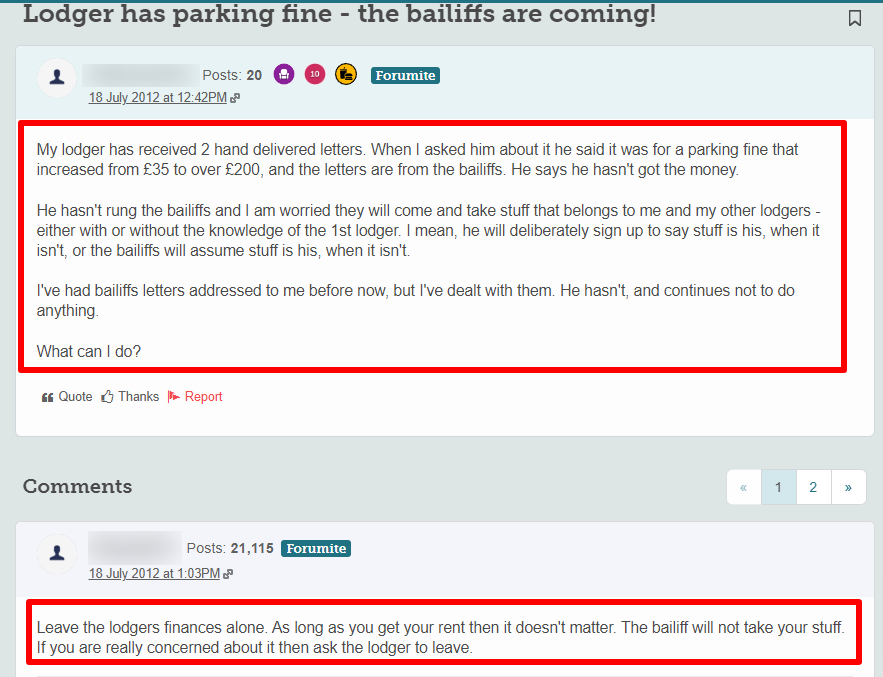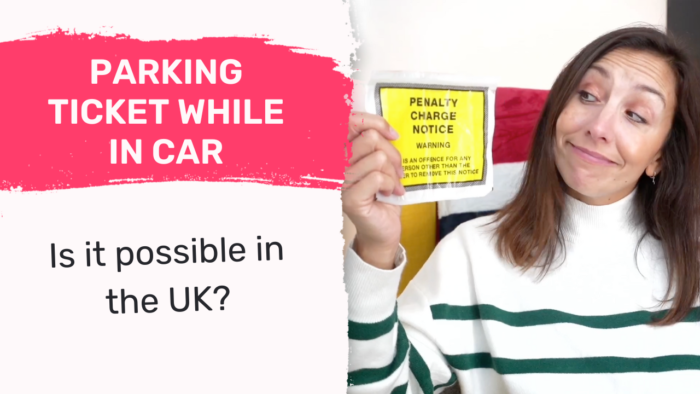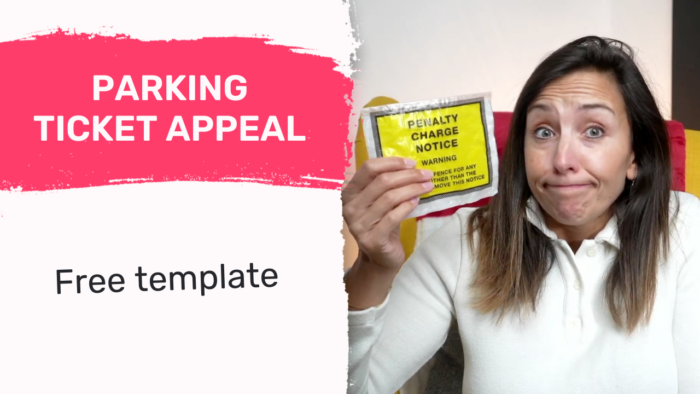Can Bailiffs Force Entry for a Parking Fine? (UK Laws)

Have you received a parking fine and are not sure what to do next? Don’t worry, you’re not alone. Every month, over 32,000 people visit this website seeking advice on how to handle their tickets and fines.
In this article, we’ll walk you through:
- The difference between official and private parking fines
- How to appeal against a parking fine and increase your chances of winning
- What happens if you choose not to pay your parking fine
- If a bailiff can come to your house for not paying your parking fine
- Ways to avoid bailiff action
It can feel scary to get a parking fine, especially if you’re not sure what might happen next. But we are here to support you and guide you through this process.
Do You Have to Pay?
In some circumstances, you might have a legitimate reason not to pay your fine.
It’s a bit sneaky, but the last time I needed legal advice, I paid £5 for a trial to chat with an online solicitor called JustAnswer.
Not only did I save £50 on solicitor feeds, I also won my case and didn’t have to pay my £271 fine.
Chat below to get started with JustAnswer
In partnership with Just Answer.
Will a Bailiff Be Sent to Your Home for Not Paying Parking Fines?
Yes, whether you have not paid an official PCN or a private parking charge notice, the ultimate endpoint of the collection process is bailiffs being sent to your home.
Bailiffs can’t take just anything, there are rules on what they can and can’t take. They can’t take, for example, the tools of your trade, or anything that is seen as a basic need such as a cooker or fridge.
Can a Bailiff Force Entry Into Your Home to Collect a Parking Fine?
A bailiff can never force entry into your home unless they are serving certain types of criminal warrants. They can only enter if a) you invite them in, or b ) they can find an unlocked door to enter through.
Bailiff powers are limited, and they must follow a strict code of conduct. They can’t push you, or even touch you. They can’t force their way past you into your home, and they should not threaten you. So the simple answer to the question is, can bailiffs force entry for a parking fine? Is no. They cannot.
However, some bailiffs will try to scare you and intimidate you into letting them into your home. Don’t fall for this. And if you think a bailiff has gone too far, you should report them to the local court.
Successful Appeal Case Study
Situation
| Initial Fine | £100 |
| Additional Fees | £171 |
| Total Fine | £271 |
The Appeal Process
Scott used JustAnswer, online legal service to enhance his appeal. The trial of this cost him just £5.
| Total Fine | £271 |
| Cost of legal advice | £5 |
JustAnswer helped Scott craft the best appeal possible and he was able to win his case.
Scott’s fine was cancelled and he only paid £5 for the legal help.
In partnership with Just Answer.
Official Versus Private Parking Fines
Parking fines in the UK can come from various sources, and it’s crucial to understand the differences between penalties issued by official local councils and those by private parking companies. I’ll explain the differences, below.:
-
Official Local Council Parking Fines (Penalty Charge Notices or PCNs)
- Issued by – Local councils or authorities.
- Reason – Generally, these are given out for parking contraventions on public roads or in council-owned car parks. For example, overstaying in a paid spot or parking in a no-parking zone.
- Legality – PCNs are backed by legislation, meaning there’s a legal obligation to pay unless successfully appealed. Furthermore, a PCN doesn’t expire.
- Appeal process – If you believe the PCN was issued unfairly, you can challenge it. There’s usually an initial period (often 14 days) in which the fine is reduced, typically by 50%. If you challenge within this period and are unsuccessful, you’ll usually still have the chance to pay the reduced rate.
-
Private Parking Fines (Parking Charge Notices)
- Issued by – Private companies, which might manage parking for shopping centres, supermarkets, and other private land.
- Reason – These can be given for a range of reasons based on the rules set by the private parking company. Common reasons include overstaying the maximum allowed period or not entering your vehicle’s details correctly if required.
- Legality – Private parking charges aren’t fines or penalties in the same way that PCNs from local councils are. They’re essentially invoices for breach of contract. The company is alleging that you entered into a contract by parking on their land and then breached that contract, so owe them a sum of money as a result.
- Appeal process – If you believe the charge was issued unfairly, you should appeal directly to the parking company. If unsuccessful, you can take the appeal to an independent adjudicator. There are two main independent appeals services: POPLA (Parking on Private Land Appeals) and IAS (Independent Appeals Service). Which one you use depends on the parking company’s membership. Note, that it is perfectly acceptable to use a standard appeal letter template to start the appeal.
Join thousands of others who got legal help for a £5 trial
Getting the support of a Solicitor can take a huge weight off your mind.
Reviews shown are for JustAnswer.
What Happens if You Don’t Pay an Official Parking Fine?
In the UK, if you don’t pay a penalty charge notice issued by a local council or authority, there’s a process that typically unfolds, which I have explained, below.
- Increase in charge – If you don’t pay the PCN within the initial period (often 14 days), the charge will usually increase. For instance, if the fine was reduced by 50% for early payment, you’ll now have to pay the full amount.
- Notice to Owner (NTO) – If you haven’t paid the fine after 28 days, the council can send a ‘Notice to Owner’ to the person the vehicle is registered to. This gives you another opportunity to pay or formally challenge the PCN.
- Charge Certificate – If you still don’t pay or challenge the PCN within 28 days of receiving the NTO, the council can increase the fine by 50%. They will issue a ‘Charge Certificate’, giving you 14 days to pay the increased charge.
- Order for Recovery – If you don’t pay the increased charge within those 14 days, the council can issue an ‘Order for Recovery’. This gives you 21 days to pay the fine.
- Bailiffs/Enforcement Agents – If the charge is still unpaid after the Order for Recovery deadline, the council can get a court warrant and send bailiffs (now more commonly referred to as “enforcement agents”) to recover the debt. At this stage, not only will you be liable for the original fine and all the added charges, but you’ll also be responsible for the enforcement agents’ fees, which can significantly increase the amount you owe.

» TAKE ACTION NOW: Get legal support from JustAnswer
What Happens if You Don’t Pay a Private Parking Fine?
In the UK, many people will tell you to just ignore a private parking fine, as they are not legally enforceable. If you don’t pay a private parking fine, the process and consequences differ from official fines. I’ll explain what will happen, below.
- Reminder letters – If you don’t pay the initial charge within the specified timeframe, the private parking company will send reminder letters. These letters often restate the original charge and might add additional administrative fees.
- Debt collection agencies – If you continue to ignore the reminders, the private parking company might pass the debt to a debt collection agency. You’d then receive letters from this agency demanding payment. These agencies can’t take the same actions as bailiffs (enforcement agents), and they don’t have the power to enter your home or sell your goods. However, it can be stressful receiving these letters, and they might add additional fees.
- Legal action – If you still refuse to pay, the parking company could decide to take you to court. This doesn’t happen in all cases, as it costs the company money to do so, but it’s possible. If they win, you would have to pay the original charge plus any court costs. If you fail to pay this, it could harm your credit rating.
- Credit rating impact – If the case goes to court and you lose, but then still refuse to pay the judgment, it could lead to a County Court Judgement (CCJ) against you, which can severely impact your credit rating.
- Bailiff visits – Ultimately, if you don’t pay the private parking fine, the court might sanction bailiffs to visit your home to collect the debt. They will want money, or to take goods to be sold off to pay the debt.
Hire a Parking Solicitor for less than a coffee.

If you’re thinking about appealing your parking ticket then getting some professional advice is a good idea.
Getting the support of a Solicitor can make your appeal much more likely to win.
For a £5 trial, Solicitors from JustAnswer can look at your case and help you create an airtight appeal.
In partnership with Just Answer.


